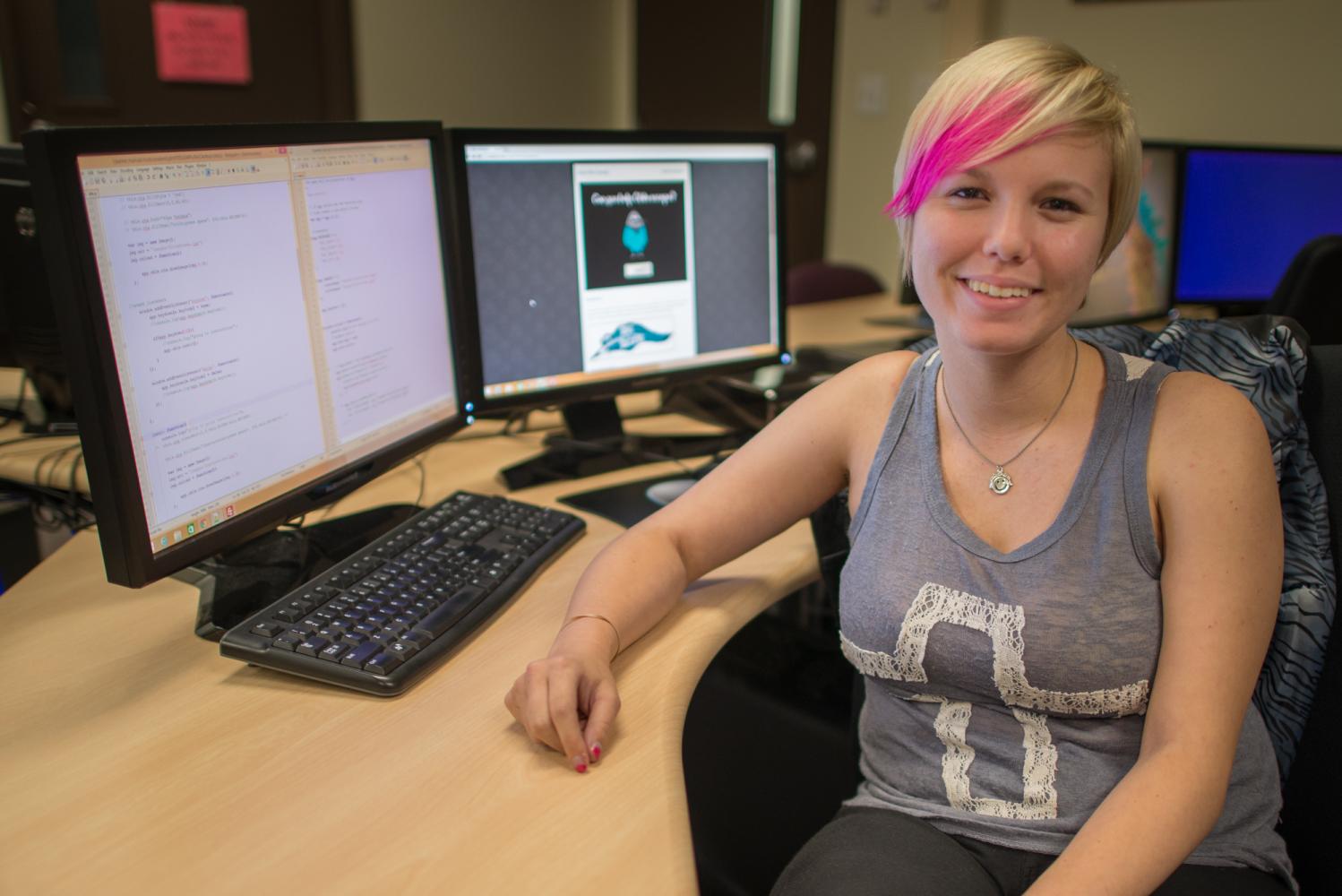Women in Game Design At RIT
by Kim Persky | published Oct. 15th, 2014

Third year Game Design Major, Jackie McGraw. (Photography by Kim Bubello)
I wasn't ever much of a gamer growing up; I had a Nintendo GameCube, and I would play Animal Crossing after school and not do much except have my characters aimlessly wander around the town. I suppose this really does speak volumes about my personality and strategic decision-making as an adult. Regardless, whenever I would turn the system on, my grandma would yell from the kitchen to stop playing with the damn video games. To be fair, she said this to my male cousin as well. However, to an extent, this was gender socialization, as I was told to do things like play house with my younger sister or help get dinner ready. With generational changes, there has been a huge paradigm shift in regards to video games. We can see this in the increasing number of female Game Design students at RIT.
From 2009 to 2014, the number of female developers in the game design industry has doubled. While that may seem like an impressive statistic, the current number is only 22 percent, meaning it is still a largely male-dominated profession. Two major issues of of discussion in the gaming industry recently have been pay inequality, sexual harassment and representation of female characters.
Two female IGM students at RIT, fourth year Katie Tigueand third year Jackie McGraw predict positive changes in the field as girls are being socialized differently than they were 15-20 years ago, and there is an increase in interest among female designers, programmers and gamers. After dealing with moms that have been skeptical that game design is a practical profession, future generations of girls will have more future gamer female role models that understand the legitimacy and benefits of gaming.
The lack of programming education in high schools geared toward girls in particular is a huge reason for this gender disparity. In a high school computer-aided design class on Long Island, Tigue stated that she was one girl out of 25 total students. Jackie’s initial interest began with digital art classes in high school, where she learned Adobe Illustrator and Photoshop.
Interestingly enough, both women claim to have encountered more gender favoritism than gender discrimination; females in the major can be more of a novelty than a threat to their male counterparts.
McGraw credits her success and equality to peers with her involvement with the Computer Science House since her first year. Two older male classmates took her under their wing to teach her the ropes of programming and developed a sense of protectiveness towards her. In her perception, this was not due to her gender, but more to her lack of programming knowledge, and they wanted to make sure she would be able to keep up. However, she thinks a male in this same situation would have been thrown out more on his own to learn for himself.
Despite the many feelings of camaraderie and equality, McGraw stated that “It’s easy to get pushed around if you’re quiet.” It is often assumed with group projects that girls want to be involved in the design aspect and not the programming.
Class and lab time also solicits unwarranted critiques of their work. Both girls had experiences of being crowded around, while other guys playing the same exact game would be left alone. Labbies are also much more willing to provide assistance to women in the game labs.
Given the scattered few females in the program, there are often clashes. There are rarely more than five females in any given class.
I've noticed a similar phenomenon being in a female-dominated major myself. The importance of balancing the gender ratios is constantly being preached to us, and there is an increased sense of competitiveness between males. Due to the value men bring based solely on their gender, there is favoritism similar to what the female Game Design majors experience.
In Game Design, it’s very much every woman for herself, and according to McGraw, girls can be even more sexist than men – against themselves. Tigue, GCCIS senator and a member of Women in Computing, says that the women do very little to band together. In her opinion, other majors such as Computing Security or Software Engineering have higher tensions between the sexes.
Tigue has completed three co-ops so far and claims to have recieved equal pay to her male counterparts, given the skills she had at the time of each co-op. The camp she worked at even had four women in managerial positions, compared to their one male manager.
Whenever McGraw or Tigue is offered a position or given an award, they wonder if it’s just because they are female. McGraw won an award at ImagineRIT for an Oculus Rift Racing Simulator and Tigue was offered more interviews at the Game Developers Conference as a third year student than some male graduates.
Whatever the motivations truly responsible for these dynamics, both ladies agree that the pros and cons balance each other out. Perhaps as a society, we need to reexamine our ideas of sexism. Striving for equality doesn't mean striving to tip the scales of favoritism. It means getting a job based on your ability, regardless of gender.



